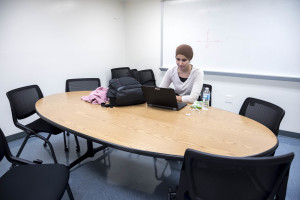ESL Students, Professors Weigh in on Their Experiences
BY: OLIVER PULCHER
Staff Writer
Approximately 400-600 students are in Meramec’s English as a Second Language programs annually — which translates to 7 to 11  percent of students frequenting ESL courses, according to Lisa Wilkinson, STLCC-Meramec ESL coordinator.
percent of students frequenting ESL courses, according to Lisa Wilkinson, STLCC-Meramec ESL coordinator.
These students frequently struggle with overload and frustration as they learn in an environment where all they hear is English, said Wilkinson, and many are parents with full-time jobs who study in the time they have available.
Wilkinson, who speaks French, English and some Uru, got her start with ESL at Maryville University, where she said she discovered a large international community and was inspired to pursue it.
There are so many benefits,” she said. “Usually, students experience the added benefits of learning a second language – life gets easier, making college possible for the first time, and it improves brain activity overall.”
Students also gain cognitive benefits, such as increased brain function, attribution to globalization and a connection to non-English speakers and the global world as a whole, said Wilkinson.
ESL Student Natalia Caschetto Leocata has experienced these benefits and challenges firsthand after working to learn English for the past year. “The hardest part of learning a second
past year. “The hardest part of learning a second
language is not getting the inside jokes others have around you; [and not] being able to understand the different dialects and idioms English speakers share,” she said.
However, she said the global awareness was worth the effort. “Outside of the communicational and educational benefits, learning English helped me to see through stereotypes of other people and it helped me to see the cultural aspects of the English language,” said Caschetto Leocata.
Wilkens Jean-Baptiste, the French tutor for Meramec’s Academic Support Center, whose native language is French and who has been learning English since his senior year in high school, said the most difficult thing for him about learning a second language is “the pronunciation and grammar of English.” The biggest benefit of learning English for him is that knowledge is more accessible and available to him, he said.
Catherine Kuehner, the Japanese and Economics tutor for Meramec’s Academic Support Center, studies Japanese. Kuehner said the most difficult thing for her was “adapting to the culture that goes along with the Japanese language.” She also said that Japanese “allowed me to make more friends and provided more social benefits in general.”
Photos By: Syed Ali & Amanda Harris










